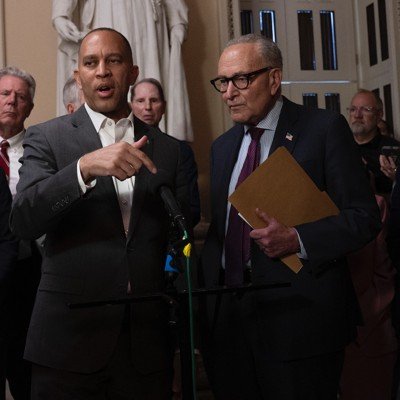Updated Sept. 11 at 6:13 p.m.
Congressional Democrats are threatening to withhold their votes on a forthcoming measure to keep federal agencies open and funded, demanding Republicans first negotiate with them over upcoming changes to health care benefits that impact millions of Americans.
With just three weeks until the government shuts down, Republican leaders in the House and Senate are preparing to put forward a stopgap spending bill that would keep agencies afloat past the current Sept. 30 deadline. Such a measure would require Democratic support in the Senate, however, and the minority party is seeking to exploit that leverage to avoid health care cuts scheduled to hit in the coming months.
“We will not support a partisan spending agreement that continues to rip away health care from the American people, period full stop,” House Minority Leader Hakeem Jeffries, D-N.Y., said on Thursday after meeting with top Democratic appropriators and his counterpart in the Senate.
Senate Minority Leader Chuck Schumer, D-N.Y., emerged from that meeting suggesting he and Jeffries were in “total agreement” on the path forward.
“What the Republicans are proposing is not good enough for the American people and not good enough to get our votes,” Schumer said. “The Republicans have to come to meet with us in a true bipartisan fashion to satisfy the American people’s needs on health care or they won’t get our votes, plain and simple.”
Around 22 million people who receive health care through the Affordable Care Act marketplace are slated to see the enhanced subsidies expire at the end of 2025 unless Congress intervenes. Those higher-level subsidies have been in place since 2021. Some Republicans have indicated they are open to extending the subsidies, but want to address the issue separately from the funding process.
Democrats are also looking to address changes to Medicare made in the One Big Beautiful Bill Act, which the Congressional Budget Office has estimated will result in around 10 million people losing their access to care over the next decade.
The government has been operating under a continuing resolution for all of fiscal 2025, meaning agencies are still funded at their fiscal 2024 levels. The proposed length of the next CR remains unclear, though Republicans are looking to bring a bill up for a vote as soon as next week.
Both the House and Senate have begun passing full year funding measures for fiscal 2026, though only the Senate has done so with broad, bipartisan support. Lawmakers could seek to fund some parts of government with full-year appropriations bills and the rest with a stopgap, though the current time crunch would make such an approach difficult to execute.
Further complicating the funding talks are the Trump administration’s efforts to unilaterally withhold previously approved spending through a process known as “pocket recissions.” Schumer previously suggested that the White House following through on such an approach would increase the likelihood of a shutdown.
This story has been updated to reflect the most up-to-date CBO estimate of the Big Beautiful Bill’s impact on Medicare coverage.




